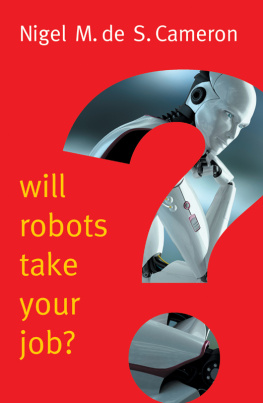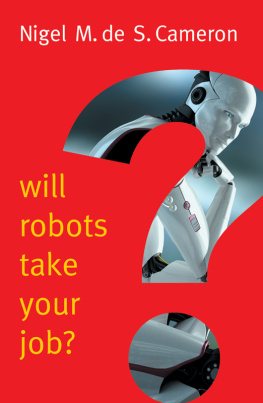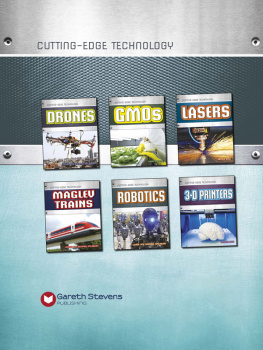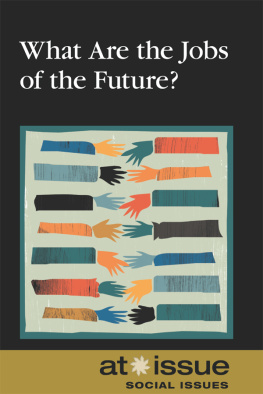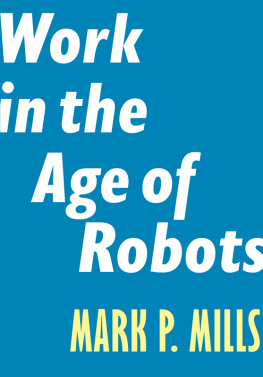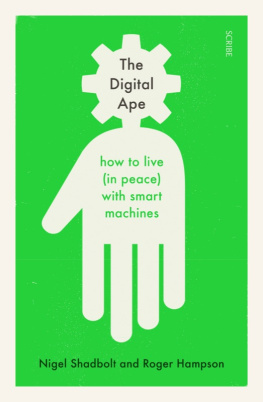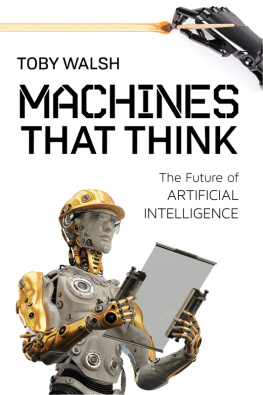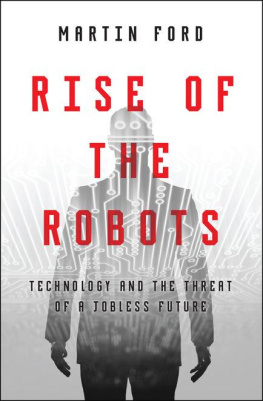
Series page
New Human Frontiers series
Nigel M. de S. Cameron, Will Robots Take Your Job?
Harry Collins, Are We All Scientific Experts Now?
Everett Carl Dolman, Can Science End War?
Mike Hulme, Can Science Fix Climate Change?
Margaret Lock & Gisli Palsson, Can Science Resolve the Nature/Nurture Debate?
Hugh Pennington, Have Bacteria Won?
Hilary Rose & Steven Rose, Can Neuroscience Change Our Minds?
Copyright page
Copyright Nigel M. de S. Cameron 2017
The right of Nigel M. de S. Cameron to be identified as Author of this Work has been asserted in accordance with the UK Copyright, Designs and Patents Act 1988.
First published in 2017 by Polity Press
Polity Press
65 Bridge Street
Cambridge CB2 1UR, UK
Polity Press
350 Main Street
Malden, MA 02148, USA
All rights reserved. Except for the quotation of short passages for the purpose of criticism and review, no part of this publication may be reproduced, stored in a retrieval system or transmitted, in any form or by any means, electronic, mechanical, photocopying, recording or otherwise, without the prior permission of the publisher.
ISBN-13: 978-1-5095-0955-3
ISBN-13: 978-1-5095-0956-0(pb)
A catalogue record for this book is available from the British Library.
Library of Congress Cataloging-in-Publication Data
Names: Cameron, Nigel M. de S., author.
Title: Will robots take your job? : a plea for consensus / Nigel M. de S. Cameron.
Description: Malden, MA : Polity, 2017. | Series: New human frontiers | Includes bibliographical references and index.
Identifiers: LCCN 2016049516 (print) | LCCN 2016057625 (ebook) | ISBN 9781509509553 (hardback) | ISBN 9781509509560 (paperback) | ISBN 9781509509584 (Mobi) | ISBN 9781509509591 (Epub)
Subjects: LCSH: Labor supplyEffect of technological innovations on. | Technological innovationsSocial aspects. | Automation. | BISAC: SCIENCE / Philosophy & Social Aspects.
Classification: LCC HD6331 .C267 2017 (print) | LCC HD6331 (ebook) | DOC 331.12dc23
LC record available at https://lccn.loc.gov/2016049516
Typeset in 11 on 15 pt Adobe Garamond Pro Regular
by Toppan Best-set Premedia Limited
Printed and bound in Great Britain by Clays Ltd. St. Ives PLC
The publisher has used its best endeavours to ensure that the URLs for external websites referred to in this book are correct and active at the time of going to press. However, the publisher has no responsibility for the websites and can make no guarantee that a site will remain live or that the content is or will remain appropriate.
Every effort has been made to trace all copyright holders, but if any have been inadvertently overlooked the publisher will be pleased to include any necessary credits in any subsequent reprint or edition.
For further information on Polity, visit our website:
politybooks.com
Dedication
For three little boys, my youngest grandchildren, who I trust will lead long and blessed lives among the machines in the world of their economic possibilities: Euan Cameron, Gideon Robison, and Lincoln Balmer.
To strive, to seek, to find, and not to yield.
Alfred Lord Tennyson, Ulysses
We are being afflicted with a new disease of which some readers may not yet have heard the name, but of which they will hear a great deal in the years to come namely, technological unemployment. This means unemployment due to our discovery of means of economising the use of labour outrunning the pace at which we can find new uses for labour.
John Maynard Keynes (1931)
Exactly how bad is the job situation going to be? An Organization for Economic Cooperation and Development study concluded that 9% of American jobs are at risk. Two Oxford scholars estimate that as many as 47% of American jobs are at risk. Even the optimistic scenario portends a serious problem. Whatever the case, it will need to be possible, within a few decades, for a life well lived in the U.S. not to involve a job as traditionally definedThe case for this time is different has a lot going for it.
Charles Murray (2016)
Preface
A short book on a complex and controversial topic is a rather dangerous thing to write. But the questions addressed here, at the meeting point of science, technology, and society, are questions for all of us, and we can't avoid them.
I've been concerned about the question of the future of jobs for many years, and in the past have made efforts to convene discussions among policymakers and other leaders. Until three or four years back hardly anyone was prepared to talk; and despite the fact that there is now a discussion taking place, at least on the fringe of public life (evident in the appearance of a spate of new books, and quotable quotes from the likes of Bill Gates, Larry Summers and Charles Murray), things have not changed that much. Political leaders still skirt the question and its enormous implications.
My personal interactions have been instructive.
A few years ago, I sat down for lunch on a sunny Menlo Park day with two partners from a global law firm who work with clients in Silicon Valley. There were various things on my mind, from the wine to how we get Washington more focused on innovation. But that was not the conversation they had planned. When, asked the top guy, are we going to come up with innovations that create jobs rather than destroy them? You could have knocked me down with a chip.
Shortly after, I was back in Washington and having dinner beside a top official in the US Department of Labor. I asked who on her team was working on this issue. No one, she said, and changed the subject.
The Washington think tank I lead convened a discussion some time back that involved AFL-CIO (the US labor union network) and a leading government economist, together with technology guru Marshall Brain. I asked someone from AFL-CIO who was working on this issue. When he replied no one, I gently suggested that perhaps they should all stop what they were doing and re-focus here. When we did convene the discussion, the labor union participant seemed little concerned. I tried to goad him by talking about self-driving trucks. What if, in ten or fifteen years' time, the Teamsters, the truck drivers' union, end up with precisely no members? Soon after, I was involved when a UK institute took a similar initiative in London. Once again the labor union point of view was very much in line with the conventional wisdom. It seems that even labor leaders are worried about being labeled Luddites.
More recently, an invitation came to address a group of economists at the World Bank. I walked into their den with trepidation. What I found interesting was that after I'd finished no one informed me that economics tells us all will be well (as we sometimes hear from the techno-boosters). Of course, as we shall see, some of the most important economists in history have been among those raising the alarm. Slowly, the issue is creeping into mainstream discussion.
Again recently, I was invited to join in a fascinating conference on what the world will be like in 100 years' time. The letter of invitation, from former Brazilian President Cardoso, made the beguiling point that a child born today may well be alive in 100 years' time. Those of us with children or grandchildren need to think a very long way ahead if we are to focus on their interests and likely futures. There is nothing academic about the question. What do I advise Euan, and Lincoln, and Gideon, and my other grandchildren to plan for in their future careers? We discuss these issues as academics, thought leaders, politicians, business people, technologists, civil society representatives. But also as workers ourselves. And as parents and grandparents. What does the future hold for our children, and their children?
Next page
